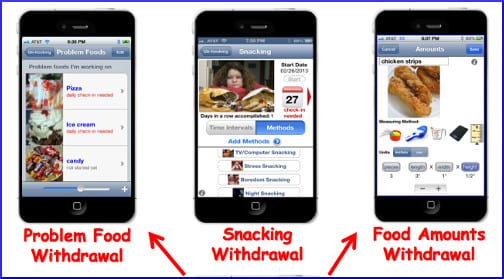The W8Loss2Go smartphone application is designed to halt food cravings and stop the urge to snack between meals. The 5-month program starts by eliminating the most tempting “problem foods” one or two at a time, a process which was shown by the preliminary studies to be surprisingly free of withdrawal symptoms. Dr. Pretlow says:
Successful withdrawal from a problem food was defined as self-reported resolution of cravings for the specific food, with a minimum required withdrawal time of 10 days for each food. The respective food would then be designated as “In-control” by the app, and the participant would proceed to withdraw from the next food.
Next, the participant is helped to curb snacking. So far, it has been possible for 70% of study participants to quit snacking entirely, while 30% were able to greatly reduce snacking frequency.
The most essential function, excessive food amounts withdrawal, takes place over 12 weeks. The method is reduction of mealtime amounts by small stages, which the app guides a young person through in an incremental manner. This “baby steps” approach of subtracting a bit each time minimizes discomfort and helps the user to not miss the customary amounts.
Let’s invent a 14-year-old named Skip. What Skip will do is weigh every food amount he typically eats at meals with a wireless food scale and record it, up to a total of 25 foods. After this information is recorded, the app guides Skip through the subsequent steps. At each meal he will place a plate on the scale, select a food for the meal in the app, and let the app tell him how much of the food to add or remove from the plate to achieve the next increment of amount reduction. He will repeat this for each different food that composes the meal, and then snap a picture of the completed plate, which is viewable by his mentor with the weights of the foods.
An Early Lesson
Of note from the W8Loss2Go pilot studies is that the technique did not work well when the young person was allowed too much discretion. In the beginning, after taking a serving of food, the participant was asked to merely return one-quarter of the amount. But this led to indecision about how much to serve out initially, and about how much to put back. This uncertainty was stressful, and as we know, the result of that is “stress eating.” Much better results are obtained by handing these decisions over to the app, interfaced to a wireless food scale.
The app allows no second helpings, of course, and the use of smaller plates or bowls has a helpful psychological effect. Parents are asked to lend a hand in several ways, including not keeping serving bowls on the dining table.
The concept of staged food withdrawal is shown to be readily acceptable by the kids who have tried it out, and quite feasible as an addiction-based treatment model. The smartphone platform, aided by input from health professionals, brings a lot of hope to the area of childhood obesity mitigation. So far, Skip is more likely than Sue to achieve real progress. Dr. Pretlow notes:
This approach has considerable potential to address a critical treatment gap in childhood obesity especially for boys. Future programs need to investigate tailored techniques to the addiction approach for girls and older adolescents.
So far, three pilot studies have been conducted of this intensive treatment using addiction medicine methods, and the potential is great for helping overweight and obese young people to help themselves.
The page titled Weight Loss App Pilot Study Information gives details on the next upcoming study which starts in early fall of 2015. Any parents of obese kids in the area of Seattle, Washington, might want have a look.
Your responses and feedback are welcome!


 FAQs and Media Requests:
FAQs and Media Requests: 











